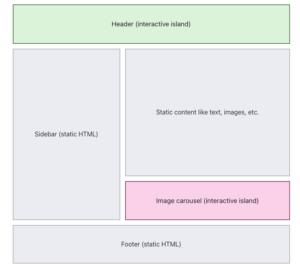In this fast-paced world of web development, speed, flexibility, and usability are crucial to creating powerful online experiences. Within this context, Astro, an innovative web framework designed to generate static sites, offers exceptional performance and versatility. This blog will explore the benefits, challenges, and practical tips with Astro and its relevance today.
Astro: A Quick Look
Astro made its debut on June 8, 2022, with its first stable release, and since then, it has stood out for its performance, versatility, and accessibility for developers. Designed for a variety of purposes, including marketing sites, documentation, blogs, portfolios, and small e-commerce, Astro has positioned itself as a leading choice for those looking to build fast, customized, and affordable websites.
Astro’s key features and benefits:
Astro distinguishes itself as an all-in-one web framework, providing all the essential elements for building integrated websites. Its main features include:
- Island Architecture: A component-based web architecture optimized for content-centric websites.
- UI-agnostic: Compatible with the most popular UI frameworks.
- Content Collections: Allows us to manage the content of our website. Thus, we can organize our content by groups, validate types, generate routes, and render it as HTML.
- Zero JS: Minimizes the use of JavaScript for faster site loading.
- Server-first: Moves rendering off visitors’ devices.
- View Transitions: We can create smooth animations and transitions when navigating between pages.
This combination of features makes Astro a versatile and powerful choice for developers, allowing them to obtain the following benefits:
Speed:
Astro adopts static site generation (SSG), which means significantly faster loading compared to dynamic sites. It also renders all components on the server, eliminating the need for default hydration and therefore the use of JavaScript. According to the official documentation, Astro websites can load 40% faster with 90% less JavaScript compared to other frameworks.
Flexibility and versatility:
With an island architecture, Astro presents itself as framework agnostic, allowing the use and integration of popular UI frameworks such as React, Preact, Solid, Svelte, Vue, Lit, and Qwik. This flexibility facilitates the creation of a wide range of websites, adapting to the specific needs of each project/client.

The implementation of the island architecture is revolutionary, allowing client-side rendering of individual components only when necessary thanks to partial hydration. With Islands, most of our website remains HTML and CSS, and JavaScript loads for the individual components that need it. It is possible with islands to indicate how and when to render each component, making use of directives. This way, we can indicate if we want a component to load and hydrate immediately after our website loads or only when it is visible on the page, among other possibilities available.
Ease to Use:
Astro features a low learning curve and has useful APIs, making it an accessible choice even for beginner developers. By using a simple HTML-based markup language for template creation, Astro simplifies the development process; it is so easy to get started with this technology, that a developer who knows the basics of HTML and CSS is ready to start creating components in Astro.
Exploring Astro at Perficient: A Journey of Innovation and Performance
At Perficient, we are in the early stages of exploring Astro, and initial results have been promising. Recently, the Capabilities Development team at the JavaScript Hub has led extensive research to uncover the key benefits of Astro and address potential challenges in implementing it in real-world projects.
This process included the creation and evaluation of a small project using Astro’s key features, providing valuable insights into the improved performance it provides.
Compared to other frameworks, Astro stands out for its focus on creating content-centric websites and optimizing web performance and loading speed. Meanwhile, alternatives such as Next.js and Nuxt.js focus on creating single page apps (SPAs) and progressive web apps (PWAs), as others as React and Vue specialize on creating reusable components and interactive user interfaces.
Crucially, Astro does not aim to compete directly with frameworks such as Next.js. Rather, it offers a different and disruptive approach. The exploration and adoption of Astro is not simply a matter of choosing one competitor over another; it is a strategic decision based on the specific needs of the project and the goals we want to achieve. For example, if we require a huge web application, with complex state management across several pages, such as large e-commerce sites, applications with real-time data or blogs with frequent updates; it is preferable to use a solution like Next.js, as Astro was not designed for sites with high interactivity and state management between multiple pages.
This journey with Astro at Perficient represents a continued commitment to innovation and finding the best tools available to provide optimal solutions for our customers. As we continue to explore Astro’s capabilities and potential, we are excited to see how this disruptive choice influences the way we approach and build web projects in the future.
Conclusion: Astro in the Future of Web Development
This framework emerges as a valuable and potentially revolutionary tool in the world of web development. Its ability to address critical performance and loading speed issues positions it as an attractive choice for developers.
For those interested in using this framework, we recommend familiarizing yourself with Astro’s unique file structure and focusing on static projects, which provide clear guidance for maximizing its effectiveness. In addition, take advantage of the framework’s detailed documentation and join the active community on channels such as Discord where valuable resources are offered, facilitating learning, and troubleshooting during development.
On the horizon, Astro’s integration with Qwik suggests a continuous evolution, influencing paradigms and contributing to the advancement of more efficient and faster web applications. The possibility that the future of web development is powered by Astro is an exciting prospect. It is backed by its potential to transform the way we build and experience the web.
Written by Sindy Fuentes, Juan Solano and Julian Rodriguez.


Excelente contenido